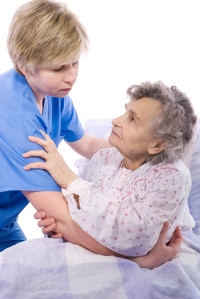I work a lot with the families of people that suffer with dementia and it is hard on everyone. For children it is hard to go from being the child, to taking over the role of the “parent” and looking after their parent, taking charge of things and often being the decision maker in situations. This role reversal is difficult and can be resisted by the person with dementia, as they try to maintain control of their lives at a time when the have no insight into their condition. They just cannot see how vulnerable they are.
I’ve had a client who said that they fancied fish & chips for tea and that they would pay for it, if someone would go to the chippy. On return with dinner, the client counted out the money to pay for the fish & chips, but had mistaken £1 for £10 notes, so offered £50 for the meal instead of the £5 it cost, counting out the notes one by one. They were fortunate to have an honest person who accepted only the right amount of money.
It can sometimes be a thankless task and numerous times I’ve seen the women of a family (usually of a generation younger) burdened with the role of caring for a loved one with dementia. I’ve all too often seen others in the family come into the situation for a short visit, criticise what is going on and leave again without offering support in a real way. Spouses are almost always willing to care for their husband / wife, as by then they may well have been together for 50, 60 or even 70 years and would not want to let down their spouse. This is hard on them as they are elderly themselves, but they are at least a very loving carer (by and large).
Family members struggle to watch the loss of dignity; they struggle with the shame of the confusion and with the loss of body function, if they are for example incontinent. It is hard to tidy up a mother, after she has wet herself, when she used to be the person who nagged you to tidy your room, do your homework and made it better when you fell over and grazed your knee! And let’s be real, dealing with any sort of body fluid when it has come out in “the wrong place” is never a wonderful task we all look forward to.
Carers require support themselves and can and should ask for respite if they need it, they will be better carers for a break. In some cases they will be entitled to carers allowance and should seek advice in that respect. They are entitled to their own assessment of their needs and should not be ashamed to ask for help, we all need support from time to time.
Carers do an amazing job and should be admired and supported for the important role they play.






Leave A Comment